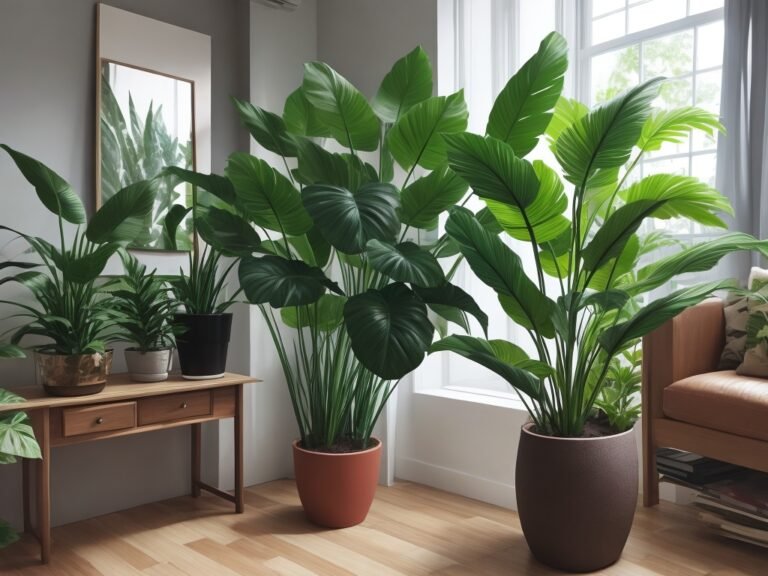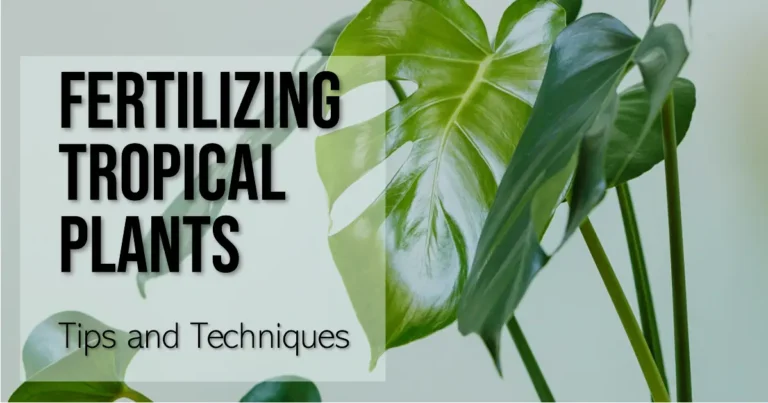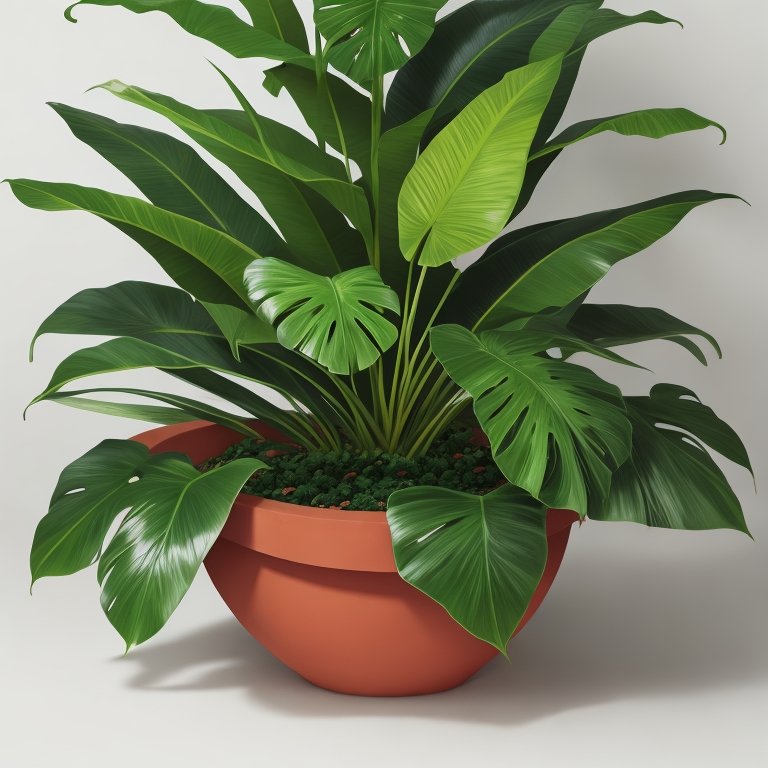Pests Begone! Organic Solutions For Tropical Plant Insect Problems
Key Takeaways:
- Organic solutions are effective in controlling insect problems on tropical plants.
- Natural predators can help in reducing pest populations on tropical plants.
- Companion planting can deter insects from damaging tropical plants.
- Regular monitoring and early intervention are crucial for successful pest control in tropical plant gardens.
Tropical plant lovers, brace yourselves for an all-natural battle against pesky insects that wreak havoc on your green oasis.
Imagine being able to protect your beloved plants without harmful chemicals or toxic sprays.
Well, get ready to say goodbye to aphids, mealybugs, whiteflies, scale insects, and spider mites! In this article, I’ll share with you the organic solutions you’ve been waiting for.
We’ll explore the benefits of organic pest control, including its safety for the environment, beneficial insects, and even your furry friends.
Plus, I’ll guide you through effective solutions for each insect problem, and provide tips on preventing future infestations.
So, let’s dive into the world of natural pest control and bid farewell to those unwanted critters for good!
| Pest | Organic Solution |
| Aphids | Release ladybugs or lacewing insects, spray with a solution of soapy water, garlic or neem oil |
| Whiteflies | Hang yellow sticky traps, release parasitic wasps, spray with a solution of insecticidal soap or neem oil |
| Mealybugs | Isolate infected plants, dab with rubbing alcohol or neem oil, apply beneficial nematodes |
| Scale insects | Scrape and manually remove, spray with a solution of soapy water or neem oil |
| Spider mites | Increase humidity, spray with water, apply predatory mites or a solution of neem oil |
Common Tropical Plant Insect Problems
Tropical plants can face several common insect problems such as aphids, mealybugs, whiteflies, scale insects, and spider mites.
Aphids
Aphids are tiny insects that can wreak havoc on your tropical plants. These pesky bugs feed on the sap of your plants, causing wilting and stunted growth.
To get rid of aphids organically, you can introduce natural predators like ladybugs and lacewings, spray a homemade garlic solution, or use neem oil.

Mealybugs
Mealybugs are common tropical plant pests. To combat them organically, you can:
- Apply rubbing alcohol with cotton swabs
- Use a neem oil solution
- Introduce predatory insects like mealybug destroyers.

Whiteflies
Whiteflies are a common pest that can wreak havoc on your tropical plants. To get rid of them organically, you can set up yellow sticky traps to catch them, spray a homemade soap solution on your plants, or release Encarsia Formosa parasitic wasps to control their population.
Scale Insects
Scale insects are a common pest that can infest tropical plants.
They look like small, oval-shaped bumps and can cause damage by feeding on plant sap.
To control scale insects organically, you can use rubbing alcohol on a cotton swab to remove them manually.
Horticultural oil spray and introducing predatory insects like ladybugs can also be effective.
It’s important to regularly inspect plants and practice good hygiene to prevent future infestations.

Spider Mites
Spider mites are tiny pests that feed on the sap of tropical plants, causing damage to leaves, discoloration, and sometimes even death. To get rid of them organically, introduce predatory mites, use homemade soap solutions, or apply neem oil.
Regularly inspect your plants to catch infestations early and practice good hygiene and plant care to prevent future infestations.
Benefits of Organic Pest Control
Organic pest control offers numerous benefits such as being safe for the environment and not harming beneficial insects. Additionally, it is non-toxic for humans and pets.
Safe for the Environment
Using organic pest control methods is safe for the environment.
Unlike chemical pesticides, organic solutions are made from natural ingredients that don’t harm the ecosystem.
They are biodegradable and don’t contribute to pollution or contamination of soil, water, or air.
Plus, they promote biodiversity by preserving beneficial insects and wildlife.
No Harm to Beneficial Insects
No Harm to Beneficial Insects is a crucial aspect of organic pest control. Organic solutions for tropical plant insect problems are designed to specifically target harmful pests, while leaving beneficial insects unharmed.
This ensures a balanced ecosystem in your garden, promoting the health and well-being of both plants and beneficial insects.
Non-Toxic for Humans and Pets
Non-toxic pest control methods are safe for both humans and pets.
These solutions do not contain harmful chemicals that can pose a risk to our health.
Instead, they rely on natural ingredients and beneficial insects to control pests.
By using non-toxic methods, we can protect ourselves, our furry friends, and the environment.

Organic Solutions for Aphids
Introduce Ladybugs and Lacewings, the natural predators of aphids, to your garden. Spray a homemade garlic solution to deter aphids from infesting your plants.
Introduce Ladybugs and Lacewings
Introducing ladybugs and lacewings into your garden is a great way to naturally control aphids.
These beneficial insects love to feed on aphids, helping to reduce their population.
You can purchase ladybugs and lacewings from garden centers or online.
Simply release them near the affected plants and let them do their job!
Spray a Homemade Garlic Solution
To make a homemade garlic solution, you can crush a few garlic cloves and steep them in water overnight. Then, strain the mixture and pour it into a spray bottle.
Spray the solution directly onto the affected plants, making sure to cover both the tops and bottoms of the leaves.
The strong odor of garlic will deter aphids and other pests from infesting your plants.
Use Neem Oil
Neem oil is an effective organic solution for controlling insects like aphids, mealybugs, whiteflies, scale insects, and spider mites on tropical plants.
Dilute the neem oil according to the package instructions and spray it directly on the infested plants.
Neem oil works by disrupting the insect’s life cycle and repelling them.
Apply it regularly until the infestation is under control.
Organic Solutions for Mealybugs
To tackle mealybug problems organically, try applying rubbing alcohol with cotton swabs or using a neem oil solution. You can also introduce predatory insects like mealybug destroyers to help control the infestation.
Apply Rubbing Alcohol with Cotton Swabs
Apply rubbing alcohol with cotton swabs directly onto mealybugs to kill them.
The alcohol dries out their bodies and prevents them from spreading.
Be sure to target the bugs hiding in crevices and hard-to-reach areas.
Repeat every few days until the infestation is gone.
Use a Neem Oil Solution
Neem oil is an effective organic solution for controlling mealybugs on tropical plants.
Dilute neem oil according to the instructions and spray it directly on affected areas.
This oil disrupts the mealybugs’ life cycle and dehydrates them, eventually causing their demise.
Be sure to apply the neem oil solution regularly for best results.
Introduce Predatory Insects like Mealybug Destroyers
Introducing predatory insects, such as the Mealybug Destroyer, is an effective organic solution for controlling mealybug infestations.
These small beetles feed on mealybugs, helping to reduce their population.
You can purchase Mealybug Destroyers online or from garden supply stores.
Simply release them near the affected plants and let them do their job.
Organic Solutions for Whiteflies
To address whitefly infestations organically, try using yellow sticky traps and spraying a homemade soap solution to control their population. Additionally, releasing Encarsia Formosa parasitic wasps can help eliminate whiteflies naturally.
Set up Yellow Sticky Traps
Set up yellow sticky traps in your tropical plants to catch and control whiteflies.
Hang or stick the traps near the plants, making sure they’re positioned at the same height or slightly above the foliage.
The adhesive on the traps will attract and capture the whiteflies, helping to reduce their population.
Regularly check and replace the traps as needed to maintain their effectiveness.
Spray a Homemade Soap Solution
Sure! To make a homemade soap solution, simply mix 1-2 tablespoons of liquid dish soap with 1 quart of water.
Transfer the solution to a spray bottle and thoroughly spray the affected plants, making sure to cover both the tops and undersides of the leaves.
This solution works by suffocating the insects and disrupting their cell membranes.
Repeat every few days as needed until the pests are gone.
Release Encarsia Formosa Parasitic Wasps
Release Encarsia Formosa parasitic wasps are a natural and effective organic solution for controlling whiteflies. These tiny wasps parasitize whitefly nymphs, which helps to reduce their population.
You can release Encarsia Formosa in your garden by purchasing them from reputable suppliers and following the instructions for release.
They work well in greenhouses and outdoor gardens, but make sure to release them early in the season for best results.
Organic Solutions for Scale Insects
To tackle scale insects organically, try applying rubbing alcohol with cotton swabs or using horticultural oil spray. Another option is to introduce predatory insects like ladybugs to control the scale population.
Apply Rubbing Alcohol with Cotton Swabs
One organic solution for mealybugs is to apply rubbing alcohol with cotton swabs. Simply dip a cotton swab in rubbing alcohol and gently rub it on the affected areas of the plant.
The alcohol will kill the mealybugs on contact, helping to eliminate the infestation.
Be sure to target the insects directly and avoid getting alcohol on the plant’s leaves or stems. Repeat this process as needed until the mealybugs are gone.
Use Horticultural Oil Spray
Horticultural oil spray is an effective organic solution for controlling scale insects on tropical plants.
To use it, mix the oil with water according to the instructions and spray it directly on the affected plants, making sure to cover both the upper and lower surfaces of the leaves.
This oil suffocates the scale insects, preventing them from causing further damage.
It’s important to apply the spray in the early morning or late evening when the temperatures are mild so as not to harm the plants.
Regular application is key for effective control.
Introduce Predatory Insects like Ladybugs
Introduce ladybugs to your garden to control common plant pests! These beneficial insects feast on aphids, mealybugs, whiteflies, and scale insects. You can purchase ladybugs from garden centers or online.
Simply release them near infested plants and let them do their work.
Organic Solutions for Spider Mites
Introduce Predatory Mites: Introduce beneficial predatory mites to combat spider mite infestations naturally. Spray a Homemade Soap Solution: Use a homemade soap solution to suffocate spider mites and keep them at bay.
Use Neem Oil: Apply neem oil, a natural insecticide, to effectively control spider mites on your tropical plants.
Introduce Predatory Mites
Introducing predatory mites is a natural and effective way to control spider mite infestations.
These beneficial mites feed on harmful spider mites, reducing their numbers and preventing further damage to your plants.
To introduce them, simply purchase predatory mites online or at a garden center, and release them onto the affected plants.
They will work their magic and help restore the balance in your garden.
Spray a Homemade Soap Solution
Spraying a homemade soap solution is an effective organic solution for tropical plant insect problems.
To make the solution, mix a teaspoon of mild liquid soap with a quart of water.
Spray the solution onto the affected areas of the plants, making sure to cover both the tops and undersides of the leaves.
The soap will suffocate and kill the insects, helping to eliminate the infestation.
Be sure to test the solution on a small area of the plant first to ensure it doesn’t cause any damage.
Use Neem Oil
Using neem oil is an effective organic solution for tackling tropical plant insect problems, including spider mites. It works by disrupting the life cycle of insects, ultimately killing them.
To use neem oil, dilute it according to the instructions on the bottle and spray it onto the affected plants, making sure to cover both the upper and lower surfaces of the leaves.
Repeat the application every 7-14 days until the infestation is under control. Neem oil is safe for the environment, harmless to beneficial insects, and non-toxic to humans and pets.
Preventing Future Insect Infestations
To prevent future insect infestations, maintain proper plant health and regularly inspect your plants for signs of infestation.
Additionally, practicing good hygiene and sanitation is key.
Maintain Proper Plant Health
Maintaining proper plant health is essential for preventing insect infestations. Regularly inspect your plants for signs of pests, such as curled leaves or sticky residue.
Practice good hygiene by removing dead leaves and debris from the plant’s vicinity.
Water and fertilize your plants appropriately to keep them strong and resilient. By doing so, you’ll create a less hospitable environment for pests and reduce the risk of infestations.
Regularly Inspect Plants for Signs of Infestation
Regularly inspecting your plants for signs of infestation is essential in maintaining their health and preventing insect problems from escalating.
Look out for visible pests, such as aphids, mealybugs, whiteflies, scale insects, and spider mites.
Check for damage on leaves, stems, and flowers, as well as the presence of webbing or sticky residue.
Early detection allows for prompt action and better chances of successful treatment.
Regular inspection should be part of your routine plant care.
Practice Good Hygiene and Sanitation
Practice good hygiene and sanitation is essential for preventing and managing tropical plant insect problems. Here are a few tips to incorporate into your routine:
- Keep your gardening tools and equipment clean and sanitized.
- Remove and dispose of any dead or diseased plant material.
- Regularly clean the area around your plants to prevent debris buildup.
- Avoid overwatering your plants, as moist conditions can attract pests.
- Practice proper watering techniques to minimize excess moisture.
- Rotate your crops and avoid planting susceptible plants in the same area year after year.
- Remove weeds and unwanted vegetation that can provide hiding places for pests.
- Avoid bringing in infested plants from outside sources.
- Follow proper plant care practices, such as pruning and fertilizing, to keep your plants healthy and resilient.
Frequently Asked Questions
Are organic solutions as effective as chemical pesticides?
Are organic solutions as effective as chemical pesticides? Yes, organic solutions can be just as effective in controlling and eliminating tropical plant insect problems.
Introducing predatory insects, using homemade solutions like garlic or soap, and employing organic products such as neem oil can all effectively combat pests without the use of chemicals.
While results may vary, organic pest control methods are safe for the environment, beneficial insects, and humans and pets.
Can I use these organic solutions on edible plants?
Yes, you can use these organic solutions on edible plants. They are safe and non-toxic for consumption.
Just make sure to follow the instructions and wash the produce thoroughly before eating.
Where can I purchase organic pest control products?
You can purchase organic pest control products at local gardening centers, nurseries, and online retailers specializing in organic gardening supplies. Some popular online stores include Amazon, Home Depot, and Gardener’s Supply Company.
Be sure to read product reviews and choose options that are specifically labeled as organic.
Final Verdict
Organic pest control offers a safe and effective alternative to chemical pesticides for managing insect problems in tropical plants. By using natural remedies and introducing beneficial insects, you can effectively control aphids, mealybugs, whiteflies, scale insects, and spider mites without harming the environment or jeopardizing the health of humans and pets.
Regular plant maintenance, inspections, and hygiene practices are essential to prevent future infestations.
Whether you’re dealing with a small backyard garden or a large tropical greenhouse, organic solutions are readily available and easy to implement. Embrace the power of nature and say goodbye to pesky insect problems in your tropical plants.







